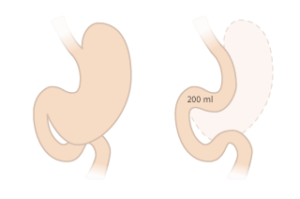Laparoscopic Sleeve Gastrectomy (Gastric sleeve surgery) is an effective bariatric procedure. Estimated weight loss is almost as big as with gastric bypass and simultaneously gastric sleeve is more “natural” as food continues to pass through all the parts of gastrointestinal tract. Sleeve gastrectomy technique has perfected considerably over recent years towards slimmer and longer sleeves with complete removal of gastric fundus yielding better and durable weight loss.
 In this operation, 85% of the stomach is removed and a banana-shaped gastric tube with a diameter of approximately 2-2.5 cm and volume of 100-150ml/3.4-5 fl. oz is formed. This reduces the gastric volume and the quantities of food ingested. In comparison, an average sized normal stomach of medium fullness is 1-1.5 litres / 34-50 fl. oz. The surgery is always performed laparoscopically.
In this operation, 85% of the stomach is removed and a banana-shaped gastric tube with a diameter of approximately 2-2.5 cm and volume of 100-150ml/3.4-5 fl. oz is formed. This reduces the gastric volume and the quantities of food ingested. In comparison, an average sized normal stomach of medium fullness is 1-1.5 litres / 34-50 fl. oz. The surgery is always performed laparoscopically.
The main difference of sleeve gastrectomy compared with bypass surgery is that, in the case of gastric sleeve, food still flows through every part of the digestive system and therefore the absorption of nutrients (including vitamins and minerals) and medications is not affected. After the surgery, the stomach and duodenum can still be examined laparoscopically , which is important for patients with certain types of stomach and biliary diseases.
How does Gastric Sleeve surgery work?
Gastric Sleeve surgery reduces appetite (hunger) and the amount of food eaten. Appetite is reduced because the part of stomach that produces the hunger hormone ghrelin is removed. A stomach reduced in size to 100-150 ml / 3.4-5 fl. oz. as opposed to the normal size of 1500 ml / 50 fl. oz. fills up remarkably more quickly and the feeling of satiety is achieved by swallowing just a couple of mouthfuls. Also the faster flow of food from the stomach’s tube to the small intestine plays a role in the reduction of appetite, as the small intestine’s contact with freshly swallowed food amplifies the feeling of a full stomach.
Who should consider Gastric Sleeve surgery?
- a BMI below 45 kg/m2
- aged over 70;
- small bowel adhesions resulting from previous surgeries, making the patient unsuitable for laparoscopic bypass surgery;
- a preference not to have to use as many vitamins and food supplements as are needed in the case of bypass surgery;
- a propensity to develop anaemia as a result of iron deficiency even prior to the surgery;
- the prospect of getting pregnant and giving birth;
- the need to use a daily dose of pain killers like diclofenac or ibuprofen;
- imminent or freshly performed organ transplant surgery;
- a diagnosed inflammatory bowel disease (ulcerous colitis, Crohn’s disease);
- a potential necessity for future endoscopic access to the stomach and duodenum.
 In this operation, 85% of the stomach is removed and a banana-shaped gastric tube with a diameter of approximately 2-2.5 cm and volume of 100-150ml/3.4-5 fl. oz is formed. This reduces the gastric volume and the quantities of food ingested. In comparison, an average sized normal stomach of medium fullness is 1-1.5 litres / 34-50 fl. oz. The surgery is always performed laparoscopically.
In this operation, 85% of the stomach is removed and a banana-shaped gastric tube with a diameter of approximately 2-2.5 cm and volume of 100-150ml/3.4-5 fl. oz is formed. This reduces the gastric volume and the quantities of food ingested. In comparison, an average sized normal stomach of medium fullness is 1-1.5 litres / 34-50 fl. oz. The surgery is always performed laparoscopically.
